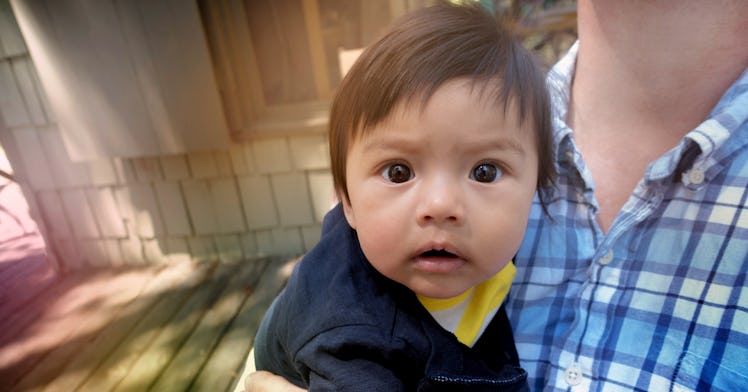Why Do Babies Stare At Me?
It's not just because you're attractive, but that too.

There’s so much life in an infant’s eyes. They wander, emote, inquire, and smile with eyes long before baby can express themselves with motions or baby talk. They also can be, well, disconcerting. Why do babies stare at me? Decades of research suggest that the “infant gaze” is common right from birth because facial features and expressions contain a wealth of information that is important for development. They’re also how we measure the attractiveness of people and, yes, the good looking are more susceptible to long stares by babies everywhere. Do they ever get a break?
“Infants can be thought of as similar to scientists who are fascinated by their subject matter,” says Forrest Talley, Ph.D., a clinical psychologist in California. “The more they study, the more knowledge they acquire. Eventually, this knowledge base allows them to expertly interact with and at least partially control the interpersonal world into which they were born.”
There’s ample evidence that babies are naturally fixated on faces. In one study, researchers showed newborns an image of a face or an image of a scrambled face. Researchers then moved the images along the newborns’ line of sight and found that they followed the images of faces longer than scrambled faces.
Another study shows that focusing on people’s faces is also how babies differentiate between their caregiver and strangers — a skill that helps them avoid dangerous situations and better protect themselves. “When infants begin to crawl, for example, they will hesitate to go further if their mother’s expression is one of alarm or fear,” says Talley.
They take environmental cues from faces, too. In a behavioral research study, toddlers showed greater fear of a toy and avoid it when their mother showed negative facial expressions. And when infants are first learning to crawl or walk, they gaze at their mothers’ facial expressions looking for the go-ahead to explore new terrain.
But why do babies stare at strangers‘ faces? Talley says it’s an adaptive response as it helps infants learn about emotions and forms a foundation for socializing and relating to others later in life.
It could also mean you’re attractive, and hard to look away from, at least according to research done by Alan Slater at the University of Exeter in the UK. For example, one of the studies he worked on found that babies as young as 4 months showed the same attractive face preferences as adults.
While the tendency to recognize faces appears innate, there’s academic debate about whether infants are born into the world with internal mental representation of a face (i.e. a template), and how detailed that template might be, says Paul Quinn, Ph.D., a psychologist at the Unviersity of Delaware who studies how infants form concepts for people, places, and things.
What is better understood is that babies see contrasting colors and are born with of 20/200 vision, so they can best recognize facial features when they’re held close to your face, the way a mother holds a baby at her breast, says Douglas Waite, M.D., developmental pediatrician at BronxCare Health System and professor of pediatrics at Mount Sinai.
Since the gaze is regarded as a normal part of development, understanding it is particularly important in the field of medicine as it can help doctors identify if there are developmental health issues.
“One of the things I always ask when I’m meeting with parents whose child has developmental issues is ‘when you were feeding them did they look at you and your eyes? When you did baby talk to them, did they smile responsively to you?’” says Waite.
The baby gaze is the beginning of attachment and the senses, like hearing and smell and vision. At two or three months of age, the absence of that can become concerning.
As such, a baby who is non-responsive to gazes may be showing early signs of an intellectual disability. So-called gaze-aversion could be an indication of a range of things — from seizure disorders, retina damage, or other developmental issues. So if your baby’s cute, or creepy, gaze toward strangers and family isn’t accompanied by an interaction like a social smile, it’s best to see a doctor and learn more.
This article was originally published on